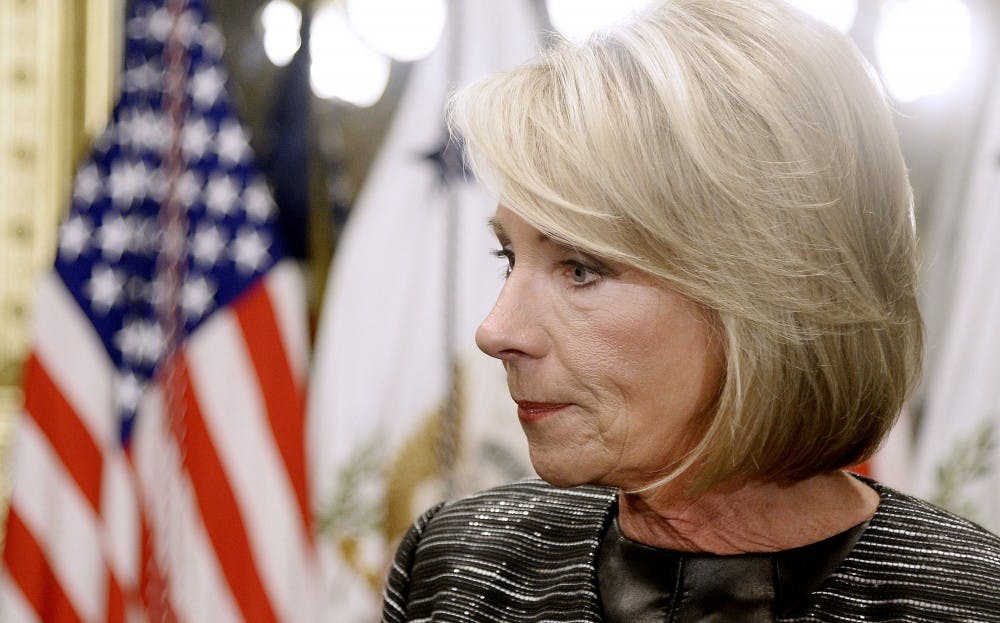Campus advocates for survivors of sexual assault are pushing back against a series of proposed changes to the Title IX that would dial back Obama-era regulations that made it easier to investigate campus sex crimes.
The proposals, first unveiled when they were leaked to The New York Times in August, are the most recent efforts by the Education Department under Secretary Betsy DeVos to strengthen the rights of the accused in these cases and limit the possible scope of campus investigations into sexual misconduct.
“(The regulations) send a message that this administration doesn’t value a student’s right to feel safe in pursuing their education,” said Carly Mee, interim executive director of the national nonprofit SurvJustice.
The new regulations, while still mired in deliberation, would among other changes only hold institutions responsible for investigating formal complaints of sexual misconduct that occurred on campus and would allow the opportunity for survivors and the accused to cross-examine one another, a process deemed inappropriate by the Department of Education under President Barack Obama.
In combination with a 2017 Education Department decision to raise the burden of evidence required to prosecute the accused, the changes represent an attitudinal shift between the Obama administration and the Trump Administration, which has sought to apply criminal prosecutorial standards to Title IX investigations.
Jasmine Lester, the founding director of Sun Devils Against Sexual Assault, a non-profit organization for survivors based out of ASU, said she sees several potential issues with the proposed changes. Her organization battles sexual misconduct that has occurred among ASU students as well as faculty.
Lester said she found one of the proposed policies particularly troubling.
“One of the guidelines says that colleges will have to launch any investigation into sexual violence with the assumption of innocent before guilty for the accused,” Lester said. “In a perfect world, that’s great, but this isn’t a perfect world. We live in a rape culture where rapists don’t go to jail, and cases don’t move forward. All that guideline means is that investigators have to enter a sexual assault case already assuming that the victim is lying.”
ASU, which has several open investigations into Title IX complaints, said it could not speculate on what proposals will and will not be enacted, but released a statement concerning the University’s policy on sexual assault.
“Arizona State University takes all matters of reported sexual misconduct seriously and we are steadfast in our commitment to sustain a university community that is safe and respectful to students, faculty and staff members. The University continues to build awareness and education efforts so that all students feel empowered to come forward should they experience any form of violence.”
The Department of Education has already rescinded Obama-era Title IX regulations, including the 2011 Dear Colleague Letter on Sexual Violence and the Questions and Answers on Title IX Sexual Violence dated April 29, 2014. The department said at the time that the Obama policies, “… created a system that lacked basic elements of due process and failed to ensure fundamental fairness.” Both of these revocations occurred in 2017, the same year Betsy DeVos announced that she and the Department would be creating a new system of rules devoted to campus sexual misconduct.
In 2017, after the changes were announced, all three major Arizona public universities said they would not change their standards for Title IX investigations.
Senior Vice President for Educational Outreach and Student Services James Rund told The State Press then that “...the current standard still applies, if something changes over the course of time, we’ll give thoughtful consideration to that."
But for some organizations these changes are overdue, serving to protect not only survivors of sexual assault, but also ensuring due process for the accused.
Cynthia Garrett, co-president of the Families Advocating for Campus Equality, said one positive effect of the new regulations would be that the Education Department Office for Civil Rights, which investigates Title IX claims, would take a more cooperative approach to extensive investigations and as a result, schools would be more willing to come forth concerning sexual misconduct on campuses.
“A lot of schools in the past were actually afraid to take cases to the OCR because in the past administration, when they would open an investigation, they would go back years, rather than focusing on that particular case," Garrett said. "They would look for a pattern of sexual violence in the school, even when there was none.”
She still has concerns, though, especially with the cross examination provisions.
“I can’t imagine anyone is going to let someone accused of sexual assault actually cross examine the accuser, obviously that’s not acceptable,” Garrett said. “But cross examination is an invaluable tool in determining credibility, and it’s important because when you’re questioning someone in real time and watching their expressions, their responses are going to be more honest."
Mee said these proposals stem from a lack of understanding of what Title IX actually is.
“Title IX is not a civil or a criminal court, it requires schools to provide a safe environment for its students, so it is held to different measures," Mee said. "Sexual violence poses a huge cost to the survivors financially, and in terms of their future. They may have to leave campus if their attacker isn’t held accountable."
However, while Mee acknowledges that the proposals spell uncertainty for the future of how colleges choose to address incidents of sexual misconduct, she remains cautiously optimistic.
“Universities would still run the risk of being held liable at the civil level if they mess up an investigation,” Mee said. “I think (colleges) will consider all the work they’ve done up until now to rework their policies for their students’ safety, and hopefully will continue to make that a priority rather following these regulations.”
Editor's Note: This story has been updated to clarify a paraphrase by Cynthia Garrett.
Reach the reporter at Jennifer.Lee.Carroll@asu.edu or follow @lacyjacy2 on Twitter.
Like The State Press on Facebook and follow @statepress on Twitter.




